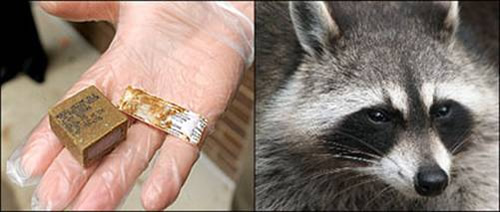September 9, 2010

Nassau County Dept. of Health Continues Rabies Baiting Program
Raccoon Rabies Vaccine to be distributed by Truck
Continuing the effort to eradicate raccoon rabies in Nassau County, Nassau County Department of Health and Cornell University will again distribute raccoon rabies vaccine to protect residents from rabies.
What: Rabies bait*, which is attractive to raccoons and includes a vaccine packet, will be distributed in raccoon habitats which include woods, bushes, streambeds, sewers and other areas.
*There is a label that clearly identifies the bait packet:
“Rabies Vaccine Live Vaccinia Vector. Do Not Disturb, Merial, Inc Us Vet Lic. No. 298 1-877-722-6725.”
When: Truck distribution will be from September 13th through October 30th, weather permitting.
Where: The baiting area will cover the northern portion of Nassau County from Queens to Suffolk borders. The southern boundary is defined by: the Northern State Parkway from Lakeview Road to Shelter Rock Road; Hillside Avenue from Herricks Road to Brush Hollow Road; Old Country Road from the Wantagh State Parkway to Round Swamp Road.
Why: With 67 raccoons confirmed to be infected with rabies since 2004, there is a high probability that other raccoons are also infected. Because of the threat to wildlife and domestic animals from terrestrial rabies, action needs to be taken quickly to prevent rabies from becoming endemic here in Nassau County.
How: Raccoons are attracted by the scent of the bait and are immunized when they eat the contents of the vaccine packet.
Recommendations: The New York State and Nassau County Departments of Health recommend:
--To avoid inadvertent contact with the baits, supervise children’s outdoor activities both during and for approximately one week following the bait distribution.
--Keep all dogs and cats indoors or on leashes during the oral bait distribution and for about a week afterwards. This will allow raccoons to eat the vaccine-laden baits and become immunized and will decrease the chance of pets eating the baits.
--The baits are not harmful to dogs or cats, but a pet may vomit if they eat a large number of them. Do not try to remove a packet from an animal’s mouth.
--Call immediately in the unlikely event that a child bites through the packet and ingests the liquid.
--Wash hands immediately before calling to report the exposure if anyone comes in bare-hand contact with the bait (even if the bait is intact.) The bait packet itself will not harm anyone.
--Call if you have seen your pet with bait in its mouth.
--Whenever there is direct contact with the bait, contact the Poison Control Center at (516) 542-2323.
--Remember that it is not possible to get rabies from the vaccine. The vaccine does not contain the rabies virus. It does contain attenuated vaccinia virus. This is a weakened version of the virus used in people for smallpox vaccination.
--If residents find bait near their homes, but not in the open, leave it alone. The bait packets have a strong fishmeal smell that is not attractive to people or to most other animals.
--If the bait is intact and out in the open where pets or children are more likely to encounter it, toss it into deeper cover under trees or bushes while wearing gloves or using a plastic bag.
--Residents who see raccoons should NOT try to trap the raccoons themselves. Call a licensed trapper.
General Information: Rabies is a viral infection that affects the nervous system of raccoons and other mammals, including humans. The disease is essentially always fatal once clinical signs of infection occur. Vaccination will greatly decrease the chance of human and domestic animal contact with rabid raccoons. Rabies is transmitted by the bite of a rabid animal. However, the virus may also be transmitted when the saliva of a rabid animal comes into contact with cut, open, or scratched skin lesions.
For additional information regarding rabies and baiting, call Nassau County Department of Health at (516) 227-9663 weekdays from 9:00 AM – 4:30 PM or visit the department website at www.nassaucountyny.gov/agencies/health/index.html or the state website at www.health.state.ny.us/diseases/communicable/zoonoses/rabies.

